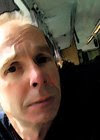I saw Harvey Wasserman speak at a downtown Columbus church March 25th. He spoke in a basement room where a small group had gathered. He talked about his book Solartopia, which lays out a near future in which everything's powered by green, renewable energy. No fossil fuels.
We'd seen his Free Press (not Bob McChesney's media reform group) partner Bob Fitrakis whip up some anti-Bush anger in 2004 in front of the statehouse and at a few other gatherings. Bob gets lit positively on fire when he speaks at rallies. But Harvey always seemed to be kind of elusive.
 A few years ago, I read his book A Glimpse of the Big Light: Losing Parents, Finding Spirit. Tanya had bid on it at Columbus Montessori's yearly fundraising gala, knowing that I was a fan of Harvey's work with the Free Press. It's one long poem about the death of his parents and what his family went through. It's an inspiring book, surprisingly positive.
A few years ago, I read his book A Glimpse of the Big Light: Losing Parents, Finding Spirit. Tanya had bid on it at Columbus Montessori's yearly fundraising gala, knowing that I was a fan of Harvey's work with the Free Press. It's one long poem about the death of his parents and what his family went through. It's an inspiring book, surprisingly positive.
I first met Bob and Harvey, and Suzanne, Bob's wife, at the Free Press media reform conference in Memphis last year. (This one is the McChesney group.) I'd rented a wheelchair --- a really good idea because it helped me keep blood in my upper body and avoid a lot of lightheadedness --- and driven 13 hours straight --- a really bad idea which raised my pain level and kept me in my hotel room the entire second day of the conference.
 Bob (pictured right, with Harvey) and Suzanne were the first people I talked with there, and I'd never actually met Bob before, so I introduced myself. Later, Harvey (above left, with me in my wheelchair) showed up and I talked with him. He and Bob and Norman Solomon were giving a presentation on energy and the media, but it must have been a more or less last-minute thing, as it wasn't in the NCMR program.
Bob (pictured right, with Harvey) and Suzanne were the first people I talked with there, and I'd never actually met Bob before, so I introduced myself. Later, Harvey (above left, with me in my wheelchair) showed up and I talked with him. He and Bob and Norman Solomon were giving a presentation on energy and the media, but it must have been a more or less last-minute thing, as it wasn't in the NCMR program.
The media reform conference was a major galvanizing experience for me. A whopper. I'll post more about it later.
I later saw Bob and Harvey at other events, including the Columbus town meeting with Federal Communications Commissioners put on by Free Press in March last year. I also took part in a Columbus City Of Peace plenary session, chaired by Bob (and moderated by Suzanne), which resulted in a resolution and statement on the war, among other issues, presented to the Columbus City Council a few weeks ago.
So, anyways, Harvey's talk at the Columbus church: He spoke about his vision of what can be done to head off global climate disaster, about the politics and technology of energy and a little bit about the history of these issues.
I took Solartopia home with me and began reading it right away. Right off the bat, it struck me as very readable and interesting. Wasserman writes from a hypothetical, 2030 a.d., post-fossil fuel perspective. He tells us what life is like when the world's societies are powered by wind, wave, geothermal, biomass, and of course, decentralized home-grown solar power-- with all the political, economic, technological and social ramifications. Freedom from Saudi oil bucks, petro wars, and the tyranny of the global petroleum trust; climate disaster headed off; air, water and food poisoning clipped, etc.
Though I thought Solartopia's start was a bit disorienting, we quickly understand what the narrative is: we're flying around the world in a jet fueled by hydrogen, first over Denmark's solar-paneled rooftops and wind turbines, tripping across the world and through recent history leading to A.D. 2030, to gain an understanding of the new life and how we got there. And we get it pretty fast, because it's so compelling and free of technical jargon, despite all the technical implications. Before I picked up this book, I'd never read anything with subject matter so potentially bo-ringgggg that held my attention so firmly.
Solartopia is one of the most hopeful books I've ever read. I highly recommend it.







